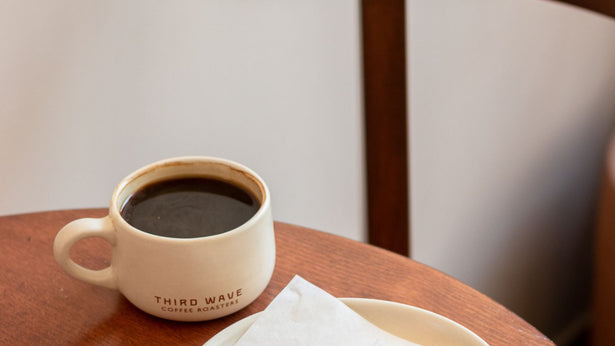Coffee is an incredibly popular and versatile beverage, yet the two most common types are black coffee and milk coffee. Though their preparation methods may be similar, these drinks have a variety of differences that set them apart from one another; both garnering enthusiastic fan bases due to their unique characteristics. From flavour profiles to caffeine content, there's plenty that distinguishes each cup of joe and we have listed some of them down for you. So regardless of which side you pick in this black coffee vs milk coffee debate, you will have the satisfaction of having a well-informed decision.
Black Coffee vs Milk Coffee: What They Are?
Bold and untainted, black coffee is simply made with just water and beans. Roasts come in a variety of colours and flavours, yet remain classified as black coffee if no additions are included. Espresso shots stand out as one type of strong brewed beverage, created by pressing hot water through fine grounds at high pressure. For those who prefer something sweeter or creamier, milk coffees such as Cappuccino, Latte, Americano and Mocha provide scrumptious options to enjoy - all without the added sugar!
Black Coffee vs Milk Coffee: The Differences
When it comes to the debate of Black Coffee vs Milk Coffee, there are distinct differences between these two beverages. Undoubtedly, black coffee is stronger than milk coffee due to its lack of sugar content while milk adds 5.1 grams in every cup. Furthermore, a glass of black coffee only consists of 4 calories compared to 60 calories found in one cup of milk coffee. In terms of colouration, pure black stands out with its striking darkness whereas adding dairy lightens the overall hue slightly. Further differences are listed below:
Caffeine Content
Despite popular belief, there is no difference in the amount of caffeine found in black and milk coffees. How much caffeine you ultimately consume depends on what type of coffee you order; both contain an espresso shot with a fixed volume of caffeine - about 96 mg or so for each cup. While black coffee does not have any additional ingredients that can add to your daily consumption, milk coffees are often blended with dairy products like cream and milk which decrease its overall caffeine content. You're actually consuming less caffeine per cup when adding milk to your coffee; this is because the espresso has been diluted. To explain further, a one-cup serving of espresso now becomes three-quarters of a cup since one-quarter consists of milk. This is the main reason why many people experience a surge in energy after drinking black coffee is due to the caffeine content.
Nutritional Value
When it comes to nutrition, people are especially careful with their calorie intake. It is therefore not shocking that they would opt for black coffee over milk coffee if trying to watch their weight. While 4 calories can be found in a cup of black coffee, approximately 60 calories make themselves present when drinking a cup of milk java — and each spoonful of sugar contributes an additional 15 calories! If the cafe beverage is made using sachet mixers, then 110 calories per serving may be expected. Nevertheless, other elements are equally essential to take into account. Milk coffee has more calories because of the infusion of milk and sugar, but it boasts an impressively high calcium content as well.
While both black coffee and milk coffee offer antioxidant benefits, black coffee contains more of the essential nutrient niacin. On the other hand, milk coffee is packed with an abundance of vitamins such as B6, B16, Folate, Riboflavin and pantothenic acid.
Unsweetened black coffee contains no sugar, which is why it has a sharp and bitter taste. However, when we compare the amount of potassium in milk coffee to that of plain black coffee, it becomes evident that the former offers more than three times as much! Both beverages contain equal amounts of iron.
Health Benefits
With the same caffeine content, black coffee is clearly more beneficial to your health in comparison to milk coffee. It can stimulate brain activity, help improve memory and even protect against cognitive decline long-term. Drinking a cup of hot black every day has been proven to ward off potential issues with forgetfulness when you get older. Additionally, its higher dose of caffeine will ensure that you remain alert throughout the day far better than drinking a milky version!
Besides, black coffee can be beneficial to your heart health. Stimulant agents in a cup of coffee increase not only the rate and pressure of your heartbeat but also its strength - just like physical activity does. In other words, having at least one mug per day might reduce the chances of developing stroke or any cardiovascular complications. Learn more about that by reading about the benefits of black coffee.
Despite this, milk coffee has multiple advantages over black coffee. Since it contains less acidity than its counterpart, it can help prevent heartburn and make your urine more alkaline instead of acidic. The mildness is derived from the addition of milk to dilute the caffeine concentration which makes for a smoother drinking experience. You might also enjoy reading about the way milk coffee benefits your health too!
Methods Of Preparation
The perfect cup of black coffee can be made using a variety of methods, whether you're using an espresso machine or relying on instant coffee powder. Experiment with the French press; try the pour-over method and discover other brewing techniques used globally. No matter which way, just remember to fill your mug afterwards!
Unlike regular coffee, making milk coffee is a bit more labour-intensive yet provides you with many options and recipes. When using whole milk as the base for your beverage, it needs to be properly frothed before adding it to the cup of joe for maximum flavour potential. With this extra effort comes an array of tantalizingly delicious drinks that are sure to please even the pickiest connoisseur!
Cost
When it comes to price, black coffee reigns supreme. Since milk, creamers and sugar are not necessary for this type of java - all that's required is the beans themselves – you're in luck if your budget can’t stretch to fancy coffees. Not only does black coffee have a lower cost than other varieties, but making it is also incredibly straightforward with water freely available and numerous brewing methods at hand. While making milk coffee at home means that you must restock on staples such as milk, creamer, and sugar regularly.
So, if you want to enjoy black coffee or milk coffee alike then begin by getting a quality pick of coffee beans for that. You can do so by checking out variations from your local market or you could even buy coffee online. We would suggest trying our El Diablo Blend which gives you a sweet, syrupy taste of orange and banana. Perfect for your joe of black or milk coffee.
